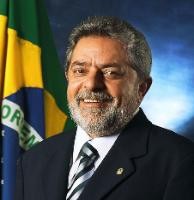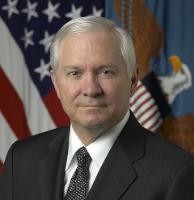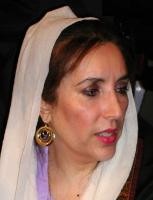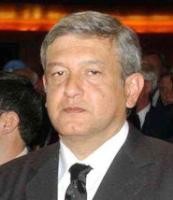I wonder which was the oddest part for Samuel Huntington: to be best-known for a thesis that was so easy to pick holes in, or one that was so often misrepresented. (Heather Hurlburt does a nice job of pointing out both — holes and misrepresentations — at Democracy Arsenal, while the Boston Globe’s obituary fills in some of the blanks for those, like me, who knew him in reference to his late-career opus.) There are admittedly many minor details — and not a small amount of major ones — that Huntington’s Clash of Civilizations got wrong. But it’s important to […]
The Americas Archive
Free Newsletter

Most of the early analysis of President George W. Bush’s Latin American legacy concentrates on his failure to engage the region despite early promises to “look south.” But the emphasis on the outgoing administration’s general neglect of Latin America has diverted attention from the strong alliance that has developed between the United States and Colombia. That alliance is based largely on Plan Colombia, an initiative signed in the late 1990s by former Presidents Bill Clinton and Andrés Pastrana to combat drug production and trafficking and the criminal organizations that control supply, as well as to stem the flow of illegal […]

Summer has kicked into high gear in the Southern Hemisphere, but that doesn’t mean the economic clouds moving ominously across global markets have only darkened skies in the North. Even in sunny Brazil, where beaches at Copacabana and Ipanema are bustling with tanned soccer players, forecasters say the economy will slow down sharply. Economic downturns almost always mean slides in approval ratings for governments. Why, then, is Brazilian President Luis Inacio Lula da Silva enjoying what may just be the highest approval rating of any president on earth? Lula — as he is chummily known by all Brazilians — is […]

When Hillary Clinton arrives at Foggy Bottom, she will inherit a State Department that has been slowly dismantled, disenfranchised, and demoralized for two decades. Recent budget increases and talk of “transformational diplomacy” cannot hide the reality that the department is a shadow of the powerful organization that helped bring down the Soviet Union. In choosing to accept a Cabinet post, Clinton has clearly indicated that she believes the path to her political legacy lies in the halls of Foggy Bottom. Ironically, in order to establish this legacy, Clinton will have to return to Capitol Hill. The problems Clinton will encounter […]
Nikolas Gvosdev flags Russia’s efforts at making inroads into the South American energy infrastructure market. I’m as struck by France’s inroads into the Brazilian weapons procurement market (via Jean-Dominique Merchet at Secret Défense): According to Brazil’s official news agency Agencia Brasil, French President Nicolas Sarkozy and Brazilian President Luiz Inacio Lula da Silva are scheduled to sign a strategic cooperation agreement Monday during the Brazil-European Union summit in Rio de Janeiro. . . . The agreement would include the transfer of technology that would allow Brazil to assemble 50 EC-725 Cougar helicopters, four conventional submarines and one submarine with nuclear […]

When Barack Obama takes office on Jan. 20, his foreign policy will almost certainly be consumed by the insurgencies in Iraq and Afghanistan. Yet Obama would do well to pay equal attention to a third ongoing insurgency, one that is currently more violent than the war in Iraq and possibly more threatening to American interests. This insurgency is raging not half a world away in the Middle East, but just across America’s southern frontier in Mexico. Since 2006, Mexico has descended into a multifaceted narco-insurgency. Well-armed and well-funded cartels are viciously fighting the government and one another over control of […]
One of the major criticisms leveled by skeptics in the COIN vs. Conventional debate has been that the focus on COIN training needed for deployment to Iraq and Afghanistan has already degraded the Army’s readiness for conventional combat operations. So this item from the Army Times caught my eye: After seven years of war in a counterinsurgency environment, theArmy will resume training next summer on major combat operations byusing simulators in scenarios against a hypothetical uniformed force. But the brigade-level exercise won’t look anything like exercises did before Sept. 11, 2001. For the first time, commanders will incorporate stability operations […]
I think I’d prefer the Obama administration taking office without any clue than to it inheriting the Bush administration’s contingency plans. This also seems to put an inordinate amount of power in the hands of bad actors to effectively extend the Bush presidency, although doing so would represent a major setback in the battle for global hearts and minds.
By signing the Convention on Cluster Munitions (CCM) at a ceremony in Oslo earlier this month, 94 countries took bold action to end the use of highly indiscriminate weapons that have maimed or killed tens of thousands of civilians. Meanwhile, a separate international effort that would set less restrictive limitations on cluster munitions may be near collapse. It is time for hold-out countries, especially the United States, to join the emerging international norm and commit to the CCM. Initially designed for use against tank divisions and other mass troop movements, cluster munitions are bombs, rockets, and artillery shells that disperse […]

Earlier this month, the Pentagon issued a directive (.pdf) raising “irregular warfare” (IW) to the same level of importance as conventional battles. The December 2008 directive defines IW as operations to fight terrorists and insurgents, enhance the defense capacity of foreign governments, and promote stability in conflict-prone regions. It asserts that it is now Department of Defense policy “to recognize that IW is as strategically important as traditional warfare.” Although the U.S. armed forces have long performed these tasks, most recently in Afghanistan and Iraq, the military has often done so only with great reluctance. The Pentagon developed considerable expertise […]

SOLEMN REMEMBRANCES, HOPE MARK DECLARATION ANNIVERSARY — The world community marked the 60th anniversary of the signing of the Universal Declaration of Human Rights on Dec. 10, with calls for stronger international institutions and remembrances of those around the world currently deprived of their rights. The U.N. General Assembly awarded the 2008 U.N. Prizes in the Field of Human Rights to several individuals, including slain Pakistani leader Benazir Bhutto and former U.N. Human Rights Commissioner Louise Arbour, as well as to the group Human Rights Watch. Meanwhile, critics slammed the U.N. and the world community for their failures to address […]
I mentioned my email correspondence with Sam Roggeveen, editor of the Interpeter. Here’s a note he sent me regarding a recent post on the increasingly endangered F-22 procurement program: You raise the possibility that US stimulus spending might find its way to the arms industry and that items like the F-22 will be offered toJapan and Australia. I really wouldn’t worry too much. Arms spending may be stimulatory inthe US, because it is domestic spending. But although Japan andAustralia are not as hard hit by the global financial crisis as the US,it is biting, so both countries will want to […]
If you haven’t made the Lowy Institute’s Interpreter blog a regular stop on your daily internet commute, I highly recommend that you do. And I don’t say that simply because I’ve struck up a collegial email correspondence with the blog’s editor, Sam Roggeveen (of which more later). The Interpreter’s contributors are all insightful analysts of not only Australia and Asia, but of America and the world as well. They offer a neighborhood perspective on the Asian Century ahead, and the kind of frank opinions of America’s role in the world that only a close and trusted friend can provide. And […]
TORREÓN, Mexico — Felipe Calderón arrived to the Mexican presidency two years ago with a weak mandate and amid wild controversy. The presidential election’s runner-up, Andrés Manuel López Obrador, alleged electoral fraud and called the new government illegitimate; his supporters took over the streets of Mexico City for weeks, and congressional allies tried to physically prevent Calderón from taking the oath of office. Calderón raced through his swearing-in ceremony in front of a crowd of scuffling legislators, before stealing off to give his inaugural address elsewhere. The inauspicious opening belied what would become a remarkably bold first year in office. […]

MEXICO CITY — Andrés Manuel López Obrador marked the second anniversary of his “legitimate government” — a symbolic opposition shadow government — with a rally in Mexico City, Nov. 23. But the mood was hardly festive, as the scorned 2006 presidential runner-up suffered a series of crushing setbacks in the preceding weeks. The energy reform package he branded as “privatization” and crusaded tirelessly against throughout 2008 was approved by Congress in late October, with backing from lawmakers in his own Democratic Revolution Party (PRD). The federal electoral tribunal dealt him a blow Nov. 12 when it overturned the annulled PRD […]

While many observers of U.S. foreign policy have in recent years lamented the state of U.S. public diplomacy, Radio Free Europe/Radio Liberty is widely seen as a bright spot amid a dim post-Cold War record of communicating and promoting U.S. values and interests to the world outside the United States. Radio Free Europe/Radio Liberty serves as a “surrogate” free press in countries around the world where such doesn’t exist, charged with promoting “democratic values and institutions by disseminating factual information and ideas,” as its mission statement puts it. Through the Internet and over the radio, RFE/RL broadcasts in 28 languages […]
I don’t have too much time to develop this thought, so I’ll treat it like an actual blog post and just toss it out there. Scanning today’s most stubborn foreign policy challenges, I’m struck by how many of them are either deferred maintenance on unresolved post-Cold War arrangements or direct legacies of Cold War policies. The Russia-Georgia conflict driving so much tension in U.S.-Russia relations, for instance, is a result of the “frozen conflict” approach to the thorny details of a final status agreement on the disintegration of the Soviet Union. The terrorist threat emanating out of the Afghan/Pakistani FATA […]
